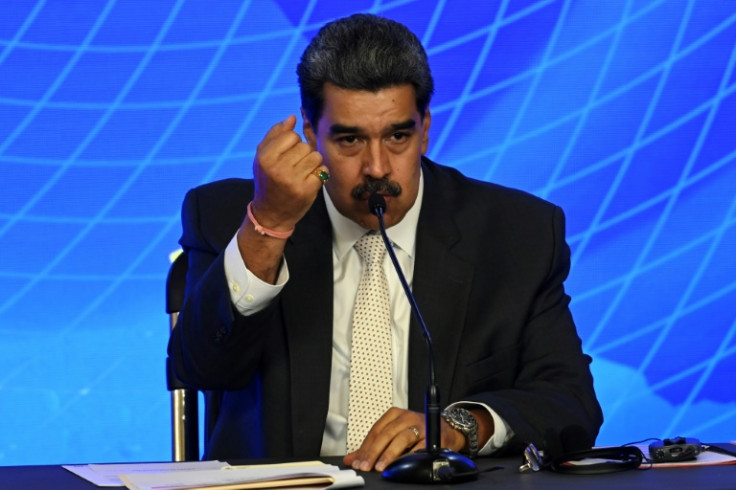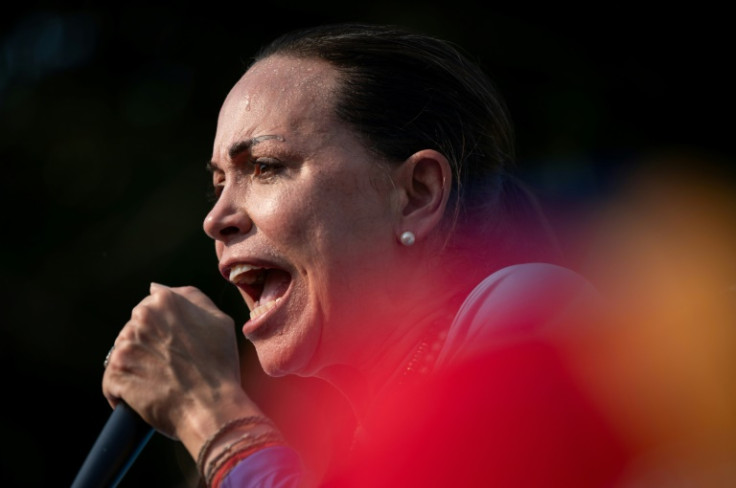
Venezuela's President Nicolas Maduro will seek a third term in July 28 elections after 11 years in office marked by sanctions, economic collapse and accusations of widespread repression.
"We'll go to a new victory," the 61-year-old said as he accepted his ruling PSUV party's official nomination to be its candidate in elections from which the state apparatus has excluded his main rival -- the favorite in opinion polls.
There was no challenger from within the "Chavista" movement, in power for 25 years and named for Maduro's popular predecessor Hugo Chavez.
"I am here for the people, that is why today, March 16 of this year, 2024, I accept the presidential candidacy for the elections of July 28," the incumbent said.
Maduro will have served 18 years as president of the once-prosperous South American country at the end of a third, successive term.
Since 2013, he has presided over a severe economic crisis, worsened by US sanctions, that has seen seven million people flee the country as GDP plummeted by 80 percent in a decade.
With backing from a system of political patronage and the military -- as well as Cuba, Russia and China -- he has consolidated power over parliament, the judiciary and other state institutions, and jailed and neutralized critics and challengers.
Opposition leader Maria Corina Machado, who polls show would beat the incumbent in a fair race, has been disqualified by Maduro-aligned courts on charges of corruption widely dismissed as spurious, and for supporting Western sanctions against the regime.
She cannot hold public office for 15 years, nor can the man widely seen as her natural replacement, two-time presidential candidate Henrique Capriles.
Maduro's re-election to a second six-year term in 2018 -- widely considered fraudulent -- was not recognized by the United States and dozens of other nations, and was met with a string of sanctions.
Many countries instead recognized parliamentary leader Juan Guaido as interim president.
Yet Maduro remains firmly in charge of oil-rich Venezuela after his rival government imploded, and the war in Ukraine choked energy supplies and shifted global priorities.
After the government and the opposition agreed in Barbados last year to hold a free and fair vote in 2024 with international observers present, the United States eased sanctions to allow Chevron to resume limited crude extraction.
But Washington is mulling reinstating penalties since the Maduro-aligned Supreme Court upheld Machado's disqualification.
In January, Maduro said the Barbados agreement was "mortally wounded" after government authorities claimed to have foiled numerous US-backed plots to assassinate him.
In a sign of things to come, the leader has increased his public appearances ahead of the electoral campaign period that only officially opens on July 4.
The CNE electoral council has said it would invite election observers from the European Union and United Nations, the US-based Carter Center NGO, BRICS and the African Union, among others, though no official invitations have been sent out.
Machado, 56, has refused to bow out, for now, despite having little chance of overcoming the hurdles the state has placed in her way.
"One day at a time," she told reporters on a tour of the industrial state of Carabobo this week, where she was met by hundreds of avid supporters who refer to her as Venezuela's "iron lady."
Analysts say that unless Machado's disqualification is somehow overturned, the opposition coalition may have to pick a substitute candidate -- from among those not yet barred by the state.
The opposition could also call for an election boycott as it had in 2018.
On Friday, a Venezuelan politician who says he is aligned with the opposition but is accused of being in cahoots with "Chavismo," asked the Supreme Court to bar Machado's coalition from putting up a candidate.
Presidential hopefuls can officially file their candidacy with the CNE between March 21 and 25.
The vote will take place on the birthday of Maduro's predecessor Hugo Chavez, still hailed by many Venezuelans as a revolutionary hero.





